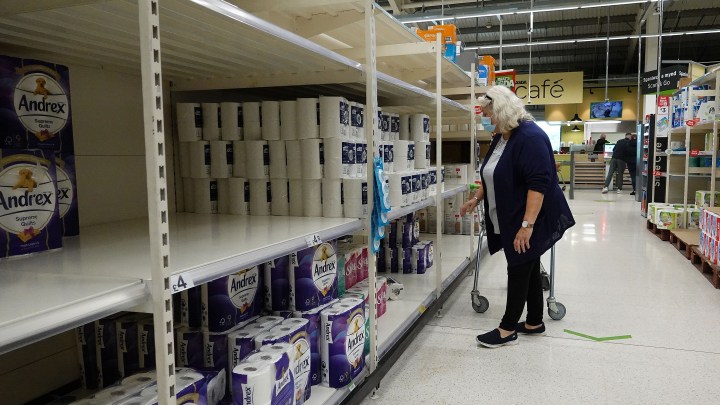
Toilet paper companies work to keep shelves stocked as shortage risk returns
Toilet paper companies work to keep shelves stocked as shortage risk returns

Kimberly-Clark has millions of toilet rolls on standby.
As England joins its U.K. neighbors and other European nations in tightening movement restrictions on Thursday, consumer products giants are more prepared going into lockdown, part two.
In the U.K., Kimberly-Clark’s Andrex — Cottonelle in the U.S. — is the most popular brand of toilet paper. Manufacturing levels at the moment are reaching 3.5 million units a day. Like in the spring, the problem this winter isn’t necessarily running out of product, but making sure it reaches shelves at the same pace consumers are buying it up.
“If our consumers want products, we’re trying to serve them,” said Ori Ben Shai, who’s in charge of the company’s U.K. operations. “We hope that by doing it, consumers will end up shopping more responsibly and more sensibly and not stock up more than needed. Whereas, if there’s a sense of shortage, they may have a higher sense of urgency.”
But, he said, as uncertainty about how long the coronavirus pandemic forces people to stay home (which inherently increases consumption) or forces countries to impose routine lockdowns, supply and demand will remain in flux.
On the global edition of the “Marketplace Morning Report,” Shai told the BBC’s Victoria Craig what steps Kimberly-Clark is taking to prevent supplies from running out as people stock up.
Ori Ben Shai: We are working very, very closely with retailers. The biggest challenge is to just get the product fast enough throughout the chain down to the shelf. It’s not really to have enough product. So what would help is, part of it is having more inventory through the different stages of supply chain, in the stores themselves or at the retailer’s distribution centers, and with us as well. And then it is getting the right capacity to just ship it down the chain fast enough so it can stay as available as possible at all stages.
Victoria Craig: It’s a balancing act, though, at least financially, I imagine, for a company like you. Are you worried that if people stock up now, and they have enough for the next few months, they won’t be buying any the next period? So how does that affect your cash flow? How do you plan for that, what future spending will be like?
Shai: Real consumption is not really going up, or it’s going up to a limited extent. Fundamentally, there is a lot of stocking [up] going on. There is so much volatility. You don’t know for example, how long will this last? You don’t know how many more waves like that would happen. It’s probably going to be a cycle that we’re still going to be in. So very, very difficult to predict. We know it will be challenging, and we are probably modeling and changing our assumptions much more frequently over the last few months than we usually are.
Craig: Are you seeing sales like you did during the first lockdown? Are you noticing that people are stockpiling more than they otherwise would have at this time of year?
Shai: Yeah, there is a spike. It’s not to the extent that we’ve seen first time around during March, April. But yeah, it’s quite significant. I’d say it seems like people are a little bit less stressed than they were. They obviously went through the experience. They saw that product is eventually available. But, yeah, you’re seeing game behavior of stocking up to an extent.
There’s a lot happening in the world. Through it all, Marketplace is here for you.
You rely on Marketplace to break down the world’s events and tell you how it affects you in a fact-based, approachable way. We rely on your financial support to keep making that possible.
Your donation today powers the independent journalism that you rely on. For just $5/month, you can help sustain Marketplace so we can keep reporting on the things that matter to you.


















